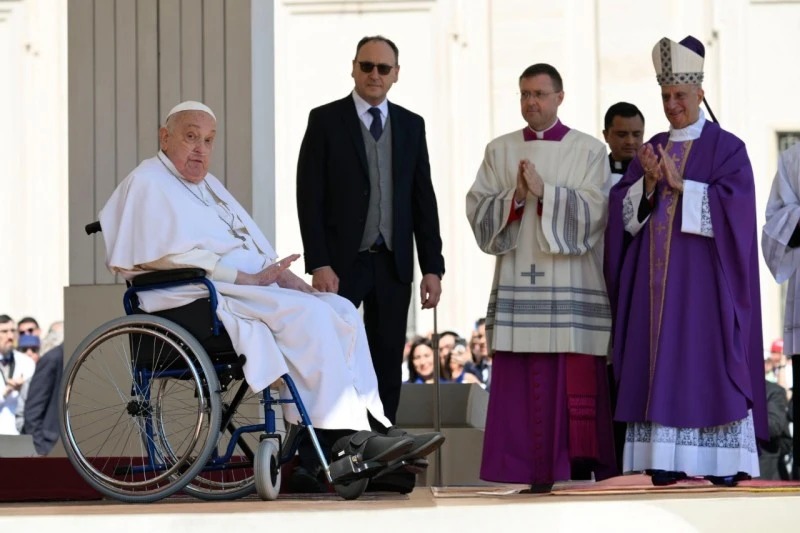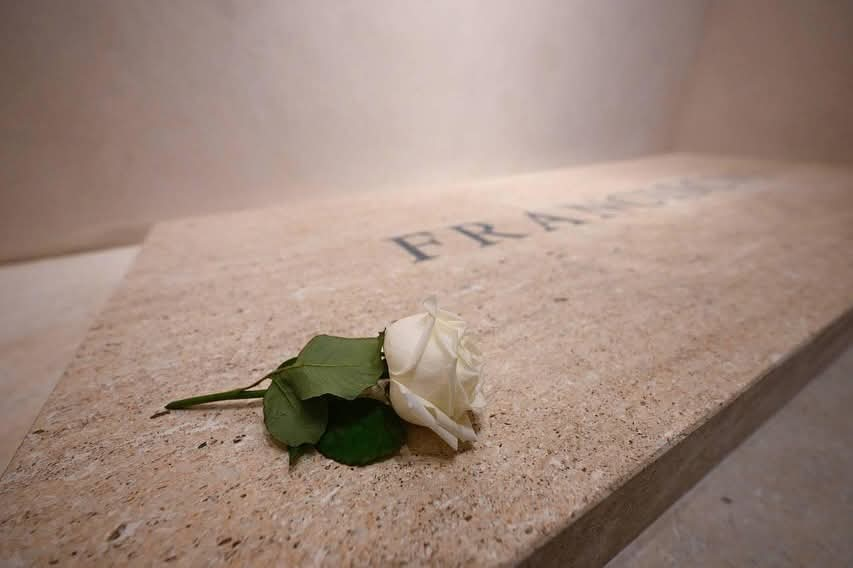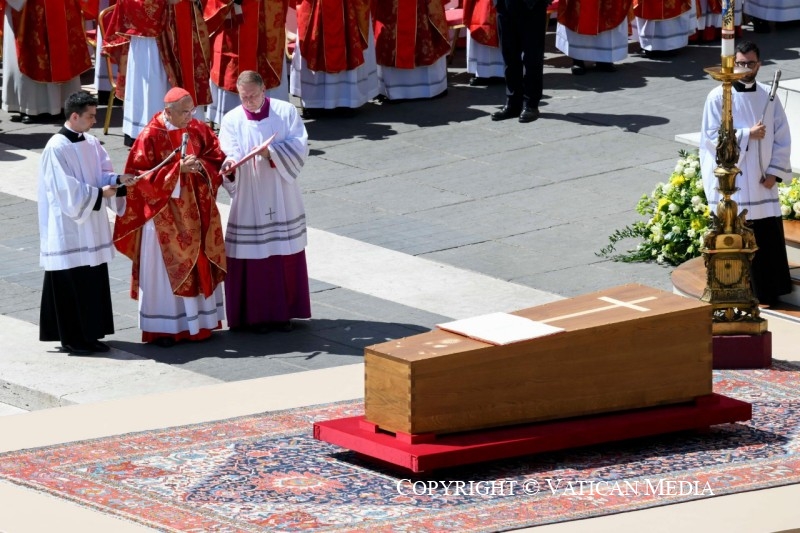The experience of illness, a school in which we learn every day to love and to allow ourselves to be loved
Homily, Jubilee for the Sick and the World of Health

This morning, the Fifth Sunday of Lent, on the occasion of the Jubilee for the Sick and the World of Health, His Eminence Archbishop Rino Fisichella, Pro-Prefect of the Dicastery for Evangelization, Section for Fundamental Questions of Evangelization in the World, presided over Holy Mass in St. Peter’s Square.
Pope Francis joined the Jubilee pilgrimage of the sick and the world of health. Before greeting the pilgrims and faithful present in the square, to whom he offered his Thanksgiving, he received the sacrament of reconciliation in St. Peter’s Basilica, gathered in prayer, and passed through the Holy Door.
We publish below the text of the Holy Father’s prepared homily, read by His Eminence Archbishop Rino Fisichella:
***
“I am about to do a new thing; now it springs forth, do you not perceive it?” (Is 43:19). God addressed these words to the people of Israel through the prophet Isaiah while they were in exile in Babylon. For the Israelites, it was a difficult time: it seemed that all was lost. Jerusalem had been conquered and destroyed by the soldiers of King Nebuchadnezzar II, and the people, now deported, had nothing left. The future was bleak and every hope seemed thwarted. Everything could have tempted the people in exile to give up, to grow bitter and to feel that they were no longer blessed by God.
Yet, in this very situation, the Lord invited them to embrace something new that was unfolding. Not something that would happen in the future, but something already happening, something springing up like a shoot. What is it? What could possibly come into being, or even have already sprouted, in such a desolate and forlorn landscape?
A new people was being born. A people that, having experienced the failure of past false securities, now discovered what is essential: to remain united and walk together in the light of the Lord (cf. Is 2:5). A people that would be able to rebuild Jerusalem because, far from the Holy City where the temple lay in ruins and where solemn liturgies could no longer be celebrated, it has learned to encounter the Lord in another way: through conversion of heart (cf. Jer 4:4), through the practice of the law and justice, through caring for the poor and needy (cf. Jer 22:3), through works of mercy.
It is the same message that we find, in a different way, in today’s Gospel (cf. Jn 8:1-11). Here too there is a person — a woman— whose life has been destroyed, not by physical exile, but by moral condemnation. She is a sinner, and thus far from the law and condemned to ostracism and death. There seems to be no hope for her either. Yet God does not abandon her. In fact, at the very moment when her accusers are ready to stone her — precisely then — Jesus enters her life, defends her and saves her from their violence, thus giving her the opportunity to begin a new life. “Go your way,” he says to her, “you are free,” “you are saved” (cf. v. 11).
Through these dramatic and moving stories, the liturgy invites us today, amid our Lenten journey, to renew our trust in God, who is ever near to us and ready to save us. No situation of exile, no violence, no sin, no fact of life can prevent him from standing at our door and knocking, ready to enter as soon as we open to him (cf. Rev 3:20). Indeed, it is precisely when the trials become more difficult that his grace and love embrace us all the more in order to raise us up.
Sisters and brothers, we read these texts as we celebrate the Jubilee of the Sick and Health Care Workers. Illness is certainly one of the harshest and most difficult of life’s trials, when we experience in our own flesh our common human frailty. It can make us feel like the people in exile, or like the woman in the Gospel: deprived of hope for the future. Yet that is not the case. Even in these times, God does not leave us alone, and if we surrender our lives to him, precisely when our strength fails, we will be able to experience the consolation of his presence. By becoming man, he wanted to share our weakness in everything (cf. Phil 2:6-8). He knows what it is to suffer (cf. Is 53:3). Therefore, we can turn to him and entrust our pain to him, certain that we will encounter compassion, closeness and tenderness.
But not only that. In his faithful love, the Lord invites us in turn to become “angels” for one another, messengers of his presence, to the point where the sickbed can become a “holy place” of salvation and redemption, both for the sick and for those who care for them.
Dear doctors, nurses and health care workers, in caring for your patients, especially the most vulnerable among them, the Lord constantly affords you an opportunity to renew your lives through gratitude, mercy, and hope (cf. Spes Non Confundit, 11). He calls you to realize with humility that nothing in life is to be taken for granted and that everything is a gift from God; to enrich your lives with the sense of humanity we experience when, beyond appearances, only the things that matter remain: the small and great signs of love. Allow the presence of the sick to enter your lives as a gift, to heal your hearts, to purify them of all that is not charity, and to warm them with the ardent and gentle fire of compassion.
I have much in common with you at this time of my life, dear brothers and sisters who are sick: the experience of illness, of weakness, of having to depend on others in so many things, and of needing their support. This is not always easy, but it is a school in which we learn each day to love and to let ourselves be loved, without being demanding or pushing back, without regrets and without despair, but rather with gratitude to God and to our brothers and sisters for the kindness we receive, looking towards the future with acceptance and trust. The hospital room and the sickbed can also be places where we hear the voice of the Lord speak to us: “Behold, I am about to do a new thing; now it springs forth, do you not perceive it?” (Is 43:19). In this way, we renew and strengthen our faith.
Benedict XVI — who gave us a beautiful testimony of serenity in the time of his illness — wrote that, “the true measure of humanity is essentially determined in relationship to suffering” and that “a society unable to accept its suffering members… is a cruel and inhuman society” (Spe Salvi, 38). It is true: facing suffering together makes us more human, and the ability to share the pain of others is an important step forward in any journey of holiness.
Dear friends, let us not exclude from our lives those who are frail, as at times, sadly, a certain mentality does today. Let us not banish suffering from our surroundings. On the contrary, let us turn it into an opportunity to grow together and to cultivate hope, thanks to the love that God first poured into our hearts (cf. Rom 5:5), the love that, above all things, remains forever (cf. 1 Cor 13:8-10, 13).
Related

Timothy Schmalz, the Pope’s Sculptor
Exaudi Staff
29 April, 2025
7 min

Cardinal Parolin at the Novendalia Mass: “Mercy leads us to the heart of faith”
Exaudi Staff
27 April, 2025
8 min

Pope Francis’ Tomb in Santa Maria Maggiore
Exaudi Staff
27 April, 2025
1 min

Mercy and the joy of the Gospel are two key concepts of Pope Francis
Exaudi Staff
26 April, 2025
9 min
 (EN)
(EN)
 (ES)
(ES)
 (IT)
(IT)

